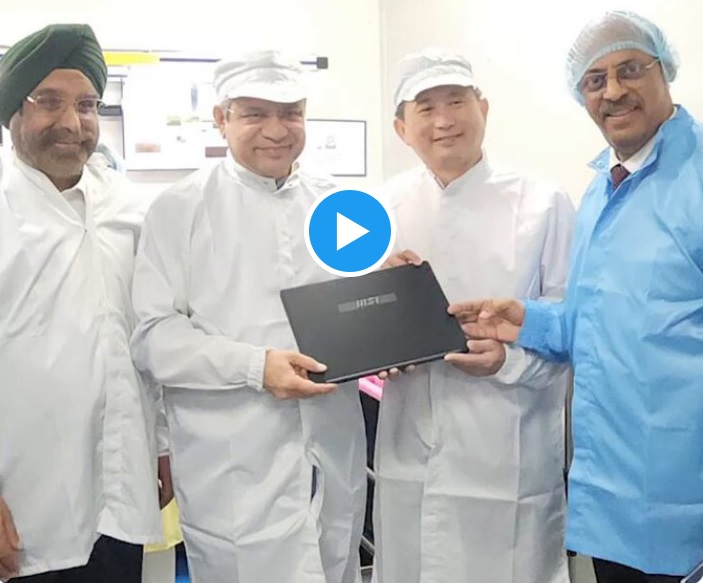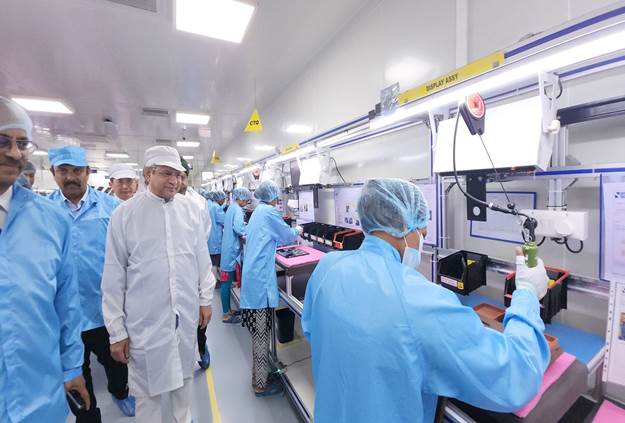From Smartphones To Laptops: India Powers Ahead In IT Hardware Manufacturing


FinTech BizNews Service
Mumbai, January 11, 2025: In a groundbreaking development for India’s electronics manufacturing sector, Union Minister of Electronics and Information Technology, Railways, and Information & Broadcasting Shri Ashwini Vaishnaw inaugurated Syrma SGS Technology’s state-of-the-art laptop assembly line in Chennai on yesterday.
This facility, located in the Madras Export Processing Zone (MEPZ), marks a pivotal shift in India’s ‘Make in India’ journey, extending its dominance from mobile phones to IT hardware manufacturing especially the Laptops.
A Milestone in ‘Make in India’
The new assembly line will initially produce 100,000 laptops annually, with a scalable capacity of up to 1 million units within the next 1-2 years. Syrma SGS currently operates four manufacturing units in Chennai, with its Unit 3 now initiating laptop production.
Speaking at the inauguration, Shri Ashwini Vaishnaw said, "We must work meticulously to ensure that the electronic component ecosystem is also developed in the coming time. This will not only drive a major growth story for India but also align with our vision of Atmanirbhar Bharat, fostering self-reliance and strengthening our position in the global electronics manufacturing landscape."
The initiative, part of the PLI 2.0 scheme for IT Hardware, highlights India’s growing capabilities in high-value electronics production and reinforces the nation’s self-reliance in IT hardware.
Key Highlights of the Assembly line
India’s electronics manufacturing sector has grown exponentially over the past decade, with total production increasing from ₹2.4 lakh crore in 2014 to ₹9.8 lakh crore in 2024. Mobile manufacturing alone has reached ₹4.4 lakh crore, with exports at ₹1.5 lakh crore in 2024. 98% of the mobile phones used in India are now being manufactured in India with Smartphones becoming the fourth largest export item from India.
Tamil Nadu: A Key Contributor
Tamil Nadu has over 47 manufacturing units supported under various schemes of the Ministry of Electronics and Information Technology (MeitY). The state is one of the largest beneficiaries of the Production Linked Incentive (PLI) scheme for Large Scale Electronics Manufacturing, with seven out of the 27 approved units under PLI 2.0 located here. The first unit under this initiative was inaugurated yesterday.
Additionally, Tamil Nadu has seen significant support through programs such as Scheme for Promotion of Manufacturing of Electronic Components and Semiconductors (SPECS), with four applications receiving MeitY backing of ₹1,200 crore, and Modified Special Incentive Package Scheme (M-SIPS), which has attracted 33 applications with an investment potential of ₹15,000 crore, supported by ₹1,500 crore from MeitY. Together, these initiatives have enabled companies in Tamil Nadu to achieve a total production exceeding ₹1.3 lakh crore to date.
The state is also home to the Electronics Manufacturing Cluster (EMC) at Pillaipakkam Village, Sriperumbudur, established by M/s State Industries Promotion Corporation of Tamil Nadu (SIPCOT). With a project cost of ₹420 crore, including ₹210 crore in support from the Government of India, this cluster is expected to attract investments worth ₹8,700 crore and create 36,300 jobs. Tamil Nadu contributes around 30% of India’s electronics exports, underscoring its pivotal role in the sector. Notably, the latest iPhone 16 Pro is proudly "Made in India" and manufactured in Tamil Nadu.
A Bright Future for laptop manufacturing Manufacturing
The inauguration of Syrma SGS’s laptop assembly line marks a new chapter in India’s electronics journey, paving the way for reduced dependency on imports, enhanced employment opportunities, and world-class manufacturing capabilities. As the facility ramps up production, India is poised to become a global leader in IT hardware manufacturing.
Status of PLI 2.0 for IT Hardware
The Production Linked Incentive (PLI) 2.0 for IT Hardware, launched on May 29, 2023, aims to further strengthen India’s electronics manufacturing ecosystem by offering a 5% incentive to eligible companies.
The scheme covers products like laptops, tablets, all-in-one PCs, servers, and ultra-small form factor devices. With a projected investment of ₹3,000 crore, PLI 2.0 is expected to drive production worth ₹3.5 lakh crore and generate 47,000 jobs across the country.
The scheme has already achieved remarkable progress, with total investments of ₹520 crore, production worth ₹10,000 crore, and has generated 3,900 jobs (As on Dec 2024).